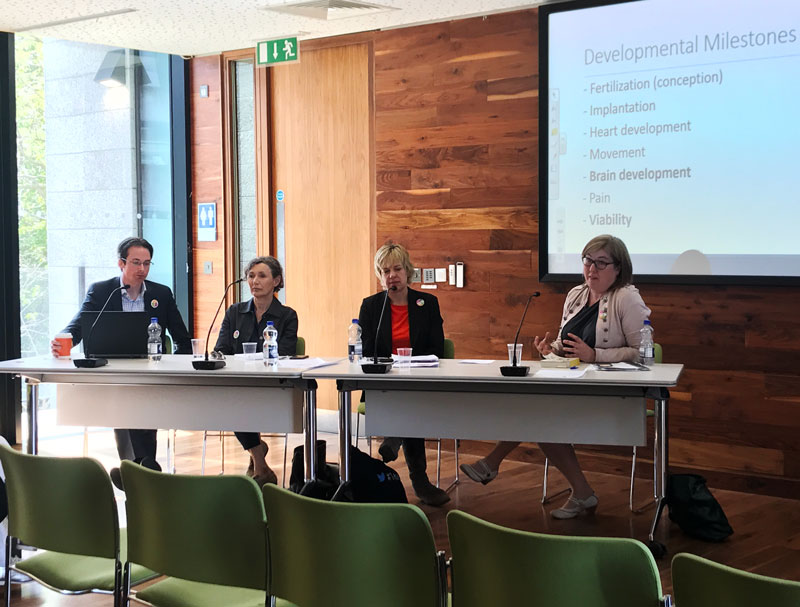
Trinity’s pro-choice staff gathered in the Trinity Long Room Hub today to discuss Ireland’s abortion law and life beyond the May 25th referendum.
Hypocrisy was a theme that often came to hand for today’s speakers – the hypocrisy of current law and the hypocrisy of those who’d deny Irish women access to abortion.
The event was organised by Trinity Staff Together for Yes and had a distinguished panel of experts in psychiatry, sociology, biology and law. Senator and Reid Professor of Criminal Law, Criminology and Penology in Trinity Ivana Bacik gave a talk on the law and legislation we can expect if the eighth amendment is repealed, while Dr Tómas Ryan from the School of Biochemistry and Immunology spoke about comparative embryology and the scientific definitions of conscious life.
Prof Veronica O’Keane, from Trinity’s School of Psychiatry, spoke about the battle still ahead for the pro-choice side. “This is not going to be a factual argument…we are not on neutral ground”, she said.
Current attitudes towards abortion, she said, are “part of who we are and this country and it is what we are fighting against”.
“This is a cultural shift”, O’Keefe added.
The accuracy of posters and ads – a contentious aspect of a sometimes fraught referendum – sparked a long discussion. Bacik noted that there are three major issues that need to be remedied for future referendums in Ireland. The first is that there is no permanent commission or body responsible for the conduct of referendums.
There is also, she said, no spending cap on referendum campaigns, unlike the UK. Bacik said that Together for Yes is “being outspent 10 to one on social media”. The regulation of social media – another issue that has caused particular anger on the pro-choice side – was also highlighted. We need to “make someone responsible”, Bacik noted.
The strategy of Together for Yes is not to be emotive, she said. The organisation has found that “the soft approach, the compassion, the care, the hard cases are what will move the immovable middle”, Bacik said.
Speaking from the perspective of science, Ryan said that he doesn’t think the no campaign “are blatantly peddling lies, but they are muddying the waters”.
Ryan talked about how Ireland allows the morning-after pill but not the abortion pill or even abortion. He explained that the morning-after pill delays ovulation if taken before. This means that any blastocyst – the cluster of cells from which an embryo forms – would die as it would not become big enough to implant. Later Ryan noted the lack of men in attendance and said that frank and open education at all levels, including primary level, would open up people’s perspective on the issue and come to similar understandings those present today have.
Yet, amidst the fierce determination to repeal the eighth, there were concerns about results day. Many admitted how strange it was to vote on the issue of women’s rights, while others acknowledged how difficult it will be to challenge the views of “institutionalised” Ireland. Come May 25th, the result will be clear.
Correction: May 9th, 2018
An earlier version of this article mischaracterised Dr Tómas Ryan’s description of how the morning-after pill works. It has since been updated with an accurate explanation.






